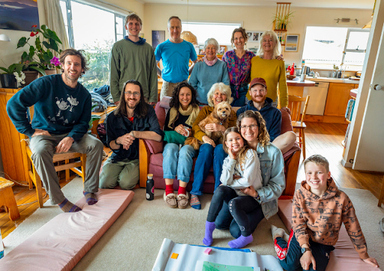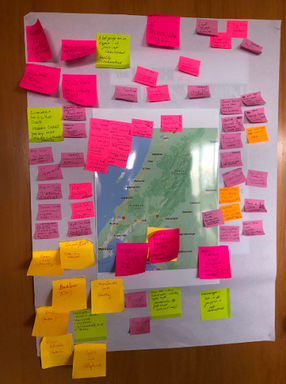We wish to provide a bit of context to our ‘newcomers’ of where Toru Education has come from, and how we went on it to rekindle its format:
The mission of Toru Education is ‘to provide experiential learning opportunities that nurture people, planet and spirit’.
The name Toru (three) connects and grounds us to the three permaculture ethics of
people care, earth care, fair share. It also connects us to the threefold teaching style of engaging hands, heart and head. For Toru, education is:
- An individual life long learning journey that is supported by an intergenerational community or network that fosters a sense of connectedness.
- A community of practice where one learns and shares useful skills that empower and lead to meaningful work and contribution.
- A place of support, creativity, and inspiration for life’s core questions, providing a scaffolding for anyone in a phase of transition who might be living with the question of ‘what’s next?’ and more importantly ‘what matters to me?’ and ‘what’s my task?’
Practically, Toru Education is a charitable trust with a geographical focus on the lower north island: Kāpiti Coast, Wellington, the Hutt Valley and the Wairarapa. Since its inception in 2016 Toru has been a legal container for a variety of courses and experiences around permaculture and sustainable living.
As an organisation, we are committed to being truly sustainable, through taking care of our people, sharing tasks in a fair way, and letting things unfold in a natural manner, without being pushed and scaled up too early - “No synthetic fertiliser - only compost!”.
First years
For three years (2016-2019), Toru Education was thriving, with the annual Permaculture Design Certificate course, a variety of one day and weekend workshops and a regular newsletter.
In 2019, Toru also supported the establishment of the Forest School for children/families at the end of Mikimiki Road just north of Masterton. Toru Trustee Hella Coenen founded The Forest School and provided wonderful nature education opportunities for children: The space for real imaginative, creative nature play. She is now looking for a successor (see community board “Asks and Offers”).
In 2020, Covid brought Toru activities to a standstill and provided an opportunity to review the format of the two week intensive PDC. In 2021, we launched a new format, a modular PDC, following the seasons across the year. The attendees were all from the region and the rhythm of intense 3-4 days together interspersed with an opportunity to digest and apply the learning back in their daily lives, meant a much deeper learning experience. This group of participants made a strong bond and meet-ups as a whole group and individual friendships continue two years on.
This format was an immense success and we feel we have really found a form of immersive learning style that works. You can read a write up of the 2021 PDC, by participant Beka Whale here. After another pause in 2022 due to COVID, the Toru Trustees now feel ready and excited to rejuvenate Toru Education.
What is next for Toru Education?
On 8 October 2023 Toru Trustees held a small workshop in Paekakariki, to explore what a rejuvenated Toru might look like. Applying a permaculture design approach to the day, we started with observing the landscape asking:
- What is already in the landscape that aligns with Toru’s kaupapa (in Kāpiti, Wellington, the Hutt Valley and the Wairarapa)?
- What is wanting to grow?
- Where are the gaps/what needs some compost?
- What role could Toru play?
From this exercise an amazing picture emerged. Everyone was surprised by how much is going on in the region and how often we don’t hear about these things. The exercise also highlighted some key gaps and from that three ‘roles’ emerged for a rejuvenated Toru Education.

Image credit: Bob Zuur
Workshop Attendees 8 October 2023 - An intergenerational mix of Toru Trustees, former PDC alumni, potential PDC hosts, tutors and friends curious about permaculture and sustainability

Image credit: Bob Zuur
One of the workshop outputs was a map of activities and organisations in the region that are aligned with the Permaculture ethics and principles.
Toru roles for Toru Education
The workshop identified three key gaps in the region and revealed three key roles for a rejuvenated Toru:
- Communicating & Connecting - Communicating everything that is already happening in the region and connecting people to aligned events, courses and opportunities.
- Facilitating a Toru Trail: A monthly event, providing an opportunity to experience the permaculture principles in practice.
- Delivering another modular Permaculture Design Certificate (PDC) - 3-4 days per season for 1 year.
Role 1: Communicating & Connecting:
- We don’t want to reinvent the wheel. Making people aware of, and connecting them to, what is already happening in the region is a gap that we feel Toru is well placed to fill.
- We plan to rejuvenate our monthly newsletter with the view to share aligned events and courses that are happening (from Kāpiti - Wellington - Hutt Valley - Wairarapa). Our aspiration is that this will link to an interactive map and calendar as a one stop shop for information.
- To ensure its longevity, we would look to create an affiliate system, whereby Toru gets a small percentage from each sign up to a course/event that comes through the Toru Newsletter/ Calendar, to help cover the administration costs and ensure the sustainability of the model. Some paid advertising with very aligned local businesses is another option we can look to implement.
Role 2: Facilitating a Toru Trail
We know there are so many people doing amazing things in our region. Participants on our 2021 PDC said that one of the most powerful elements of the course were the site visits that provided the opportunity to experience the Permaculture principles in action. From this feedback the idea emerged of a Toru Trail, involving monthly events which follow a simple recipe:
Ingredients:
- Event organiser(s).
- A host - who can tell their story, give a tour of the whenua and talk to how they have applied the permaculture principles, ideally including a practical part, where participants can help with a task.
- Shared lunch.
- A speaker - facilitating a deeper discussion on a specific permaculture topic.
- A photographer & capturer of stories to feed into a newsletter and social posts.
Format for each event:
- A check in round - providing space and time for whakawhanaungatanga.
- Time for the host to share their story and talk about how they apply the permaculture principles (e.g. What principles are thriving and what principles are still challenging); they also share their hobbies, interests, passion!
- A working bee or practical workshop or tour of the land which is facilitated by the host and enables attendees to experience the principles in action. Our experience is that it’s great for participants to be able to practically help with a task.
- A shared lunch.
- A post lunch talk from the host/or a speaker who deep dives into a particular permaculture topic, and/or personal topic of interest.
- Another round for attendees to share what’s on top - their reflections on what they have noticed when outside, their questions, their ask/needs and their offers.
- Closing the facilitated part, maybe leaving the afternoon open for other options to further explore the property.
Additionally, there could be a crop swap table for a give and take exchange of harvest produce, seeds and seedlings from each others’ gardens.
Role 3: Delivering a Permaculture Design Certificate (PDC)
- There is a clear appetite for another Permaculture Design Certificate Course in the region, with no such courses being offered in the lower North Island.
- We would continue the successful format from our 2021 course, with four modules grounded in the four seasons. This allows participants 'breathing space' in between to digest the learning, and makes it possible to balance the course commitment with the rest of their lives, increasing its accessibility. We would continue to offer the Toru Trust Scholarship, ensuring the course is accessible for those without the financial means.
- For this to happen, we need to re-configure the teaching team: Our two key tutors Gary and Emily from our past PDC courses wish to step back from being the main tutors. They would like to continue in their role of mentors, and still taking on some topics, but no longer hosting the course at their place. It will be very difficult to fill their shoesl!!
What will it take?
To bring these three roles to life we know we need to invest time upfront in re-establishing our newsletter and re-engaging with our extensive network of aligned organisations, groups and individuals as well as forging new connections across the region. Historically the Toru Trustees have carried out these tasks on a voluntary basis, however to achieve our aims and for the organisation to be sustainable we know we cannot rely solely on voluntary effort.
We have been lucky to receive website design and IT communication advice from experts in this field. With the gift of the Biome Trust, we can engage with these experts in a sustainable manner. Thank you!
- Log in to post comments
